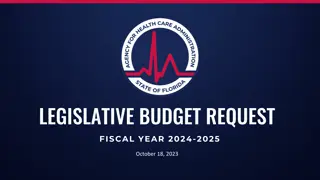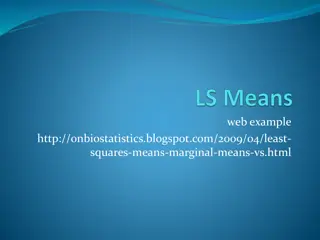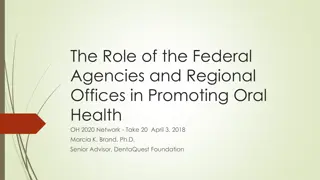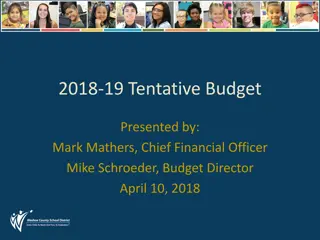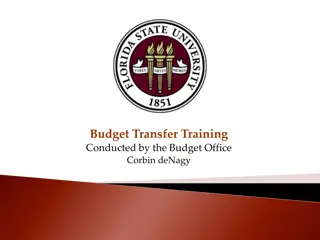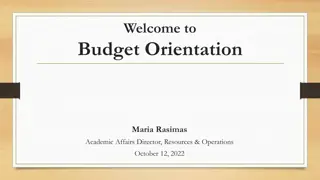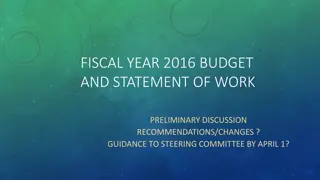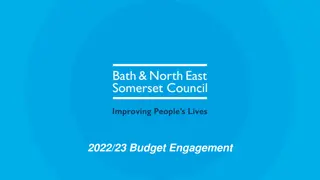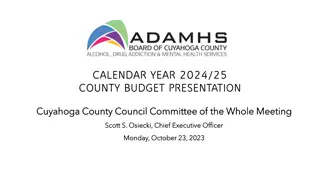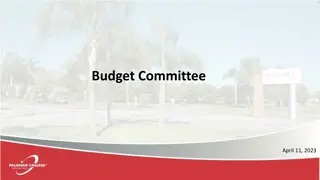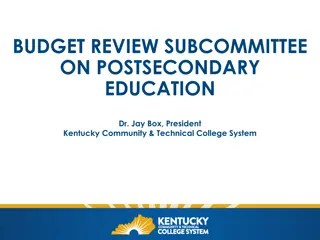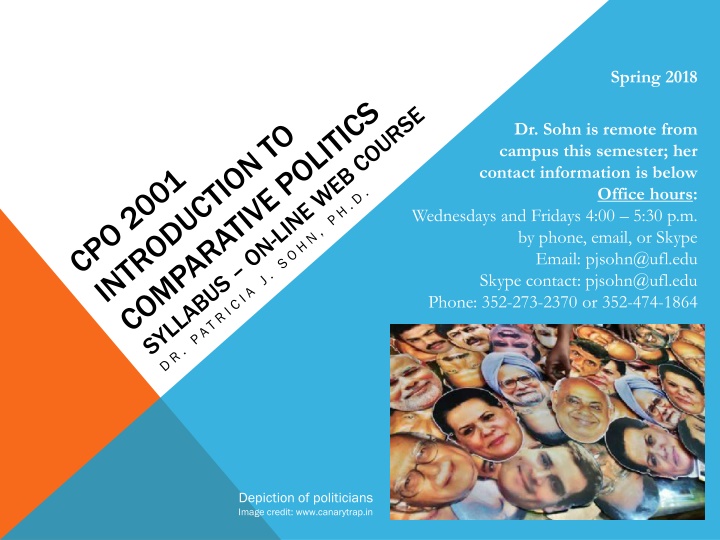
Ways & Means Committee HHS Subcommittee Budget Request Analysis
The analysis covers FY 2019-20 and FY 2020-21 budgets, utilization of funds, COVID-19 impact, expenditure patterns, and future budget projections of the Ways & Means Committee HHS Subcommittee. It highlights key areas such as Medicaid Assistance, agency policies, and financial management strategies.
Download Presentation

Please find below an Image/Link to download the presentation.
The content on the website is provided AS IS for your information and personal use only. It may not be sold, licensed, or shared on other websites without obtaining consent from the author. If you encounter any issues during the download, it is possible that the publisher has removed the file from their server.
You are allowed to download the files provided on this website for personal or commercial use, subject to the condition that they are used lawfully. All files are the property of their respective owners.
The content on the website is provided AS IS for your information and personal use only. It may not be sold, licensed, or shared on other websites without obtaining consent from the author.
E N D
Presentation Transcript
Spring 2018 Dr. Sohn is remote from campus this semester; her contact information is below Office hours: Wednesdays and Fridays 4:00 5:30 p.m. by phone, email, or Skype Email: pjsohn@ufl.edu Skype contact: pjsohn@ufl.edu Phone: 352-273-2370 or 352-474-1864 Depiction of politicians Image credit: www.canarytrap.in
EXPLANATION OF THE FIELD OF COMPARATIVE EXPLANATION OF THE FIELD OF COMPARATIVE POLITICS (COURSE DESCRIPTION) POLITICS (COURSE DESCRIPTION) Comparative politics is the study of domestic politics of states and nations around the world. It often includes an explicit dimension of comparison, although not always. When it includes a comparative dimension, comparison may be across countries, themes within comparative politics, or across time. There is often, although not always, a historical dimension to the study of comparative politics. Comparative politics took its name to distinguish itself from the study of American Politics, International Relations, or Foreign Policy. Comparative politics, at the most basic level, means the study of domestic politics of states and nations outside the United States (therefore to be distinguished from the study of American Politics). More recently, some scholars of comparative politics use the tools of comparative politics to include the U.S. in their studies to a lesser degree in some way. We try to be very careful, when we do so, to stick closely to the theme or comparative research tool at hand, since we are not specialists in American Politics. Left: Migrant workers in the U.K. (England). Image credit: dailymail.uk.com Right: India s independence day, August 2013, with a Bollywood actress, Vidya Balan, and parade in New York City. Image credit: Peter J. Smith, Wall Street Journal
EXPLANATION OF THE FIELD OF COMPARATIVE POLITICS Comparative politics is different from International Relations in that the latter tends to study international institutions, relations between elite levels of states, and international themes that find themselves within this elite level, including international political economy, international law, etc. And, finally, comparative politics is different from the study of foreign policy in that we tend to study our regions of the world from the inside-out rather than from the outside-in. That is, we do not look at Europe, Asia, Africa, the Middle East, or Latin America from an American vantage point. That is the job of scholars of American politics, or American foreign policy, as usually conceived by comparative political scientists. Our job, as we see it, most typically, is to explain the internal workings of states, politics, and state- society dynamics (including grassroots dynamics) from inside our regions of specialization. Image credit: mapsnworld.com That does not necessarily mean we are scholars who are insiders to the region on which we are specialists. Most often, comparative political scientists are not from the regions that we study; nonetheless, we study them from the inside-out rather than from an American perspective-in. This can take some getting used to when you are first introduced to the field of study that we call comparative politics.
THE FIELD OF COMPARATIVE POLITICS As you can see from this discussion already, most scholars of comparative politics specialize in one region of the world. These are usually defined as: Europe; Africa; Latin America; the Middle East/MENA Region (Middle East and North Africa); South Asia; Southeast Asia; China; or Russia/former-Soviet Union/former-Soviet Bloc. Comparative political scientists are expected to spend a significant amount of time usually years living in the region on which they are specialists so that they have significant lived experience in the region. This often means difficult living conditions over long periods of time, doing without what many Americans consider to be necessities, such as electricity, running water, air conditioning, or television. In addition to that, years spent living in their region of specialty usually include significant time in government archives, interviewing local social and political actors, and observing the political system directly. It has been emphasized many times by scholars of comparative politics that formal rules what is written on the books in constitutions, laws, and the like can sometimes be very different from how a political system functions on the ground in practice. Comparativists, as we call scholars of comparative political science, must spend significant time living in a region, thus, to be able to distinguish between theory and practice, as well as to understand the local context, as best we can, from the inside-out. My house, Jacmel, Haiti, 1977 My house, Jacmel, Haiti, 1977
PERSPECTIVE All of this is the perspective that comparative politics has to offer, and it is a different perspective than those offered by the other major fields of study within political science already mentioned.
PERSPECTIVE Take a moment to study this worldmap upside down. Really study it. Where are countries located that you are used to finding easily? How do continents look in relation to one another? Why do this? It is not to irritate your senses, I promise!
PERSPECTIVE We are used to seeing the world from the vantage point of sitting in North America. Not only that, but we see the world from the central part of North America, south of Canada and North of Mexico. For us, the world most typically looks like this. When we look at a map, we most typically imagine it from us (the U.S.)-out: Image credit: gabelli- us.com maps We are comfortable with this view of the world. It feels most natural to us, if only because of where we sit and wake up every morning on the globe.
PERSPECTIVE Below: If you live in Australia, Chile, South Africa, Madagascar, or New Zealand, this is how the world looks to you every day when you wake up, as a natural outcome of living on that location on the globe. In fact, south of the equator, in the entire part of the globe you can see on this map, hurricanes spin in the opposite direction as what we are used to (clockwise in the southern hemisphere). Even physics (not only social perspectives) can be different if you live in different parts of the globe. Image credit: worldatlas.com Above: If you live in Alaska, or in Japan, or in Norway, Finland, Sweden, Russia, Iceland, etc., the world looks more like this. This is how you see the world every day when you wake up in the morning, as a natural outcome of living in that location on the globe. I was born in Fairbanks, AK and have friends in Scandinavia; I can assure you this is true! Image credit: worldatlas.com
PERSPECTIVE MATTERS Perspective matters. Different perspectives are a natural outcome, often, of different contexts, be they geographical (as just discussed), economic, social, gender-related, norms-related, power-related, etc. It is the job of Comparative Politics to explain what domestic politics looks like from the inside-out, from the top-down, and from the bottom-up in various national contexts. This is what we do. So, you will not often hear me speak about the world in lectures from an American-centric position. This does not reflect antipathy for the U.S. I love the U.S. and have chosen to make my life here. I have lived many places and could have made my life in a number of different countries. I will explain domestic politics as much as possible from the inside-out to local contexts because it helps us to better understand how politics really works around the world. It is the job of other political scientists, policy scholars, Americanist historians and others to analyze American politics, or politics from a U.S. perspective. You will not find that in this course. If that will bother you, please choose another course. The Atlas Mountains, Morocco (Northwest Africa). The Atlas Mountains, Morocco (Northwest Africa). Rural/urban, mountain/valley, land/sea, nomadic/settled, military/civilian, etc. there are many types of vantage points or perspectives that still affect our views of one another significantly enough that they can and do affect politics in very critical ways. Image credit: http://wtlab.iis.u- tokyo.ac.jp/~wataru/lecture/rst/Sect2/Sect2_6.html
GRADE DISTRIBUTION 15% 5% 25% 25% 30% Final Group Project Viewing/Commenting on 5 Final Group Projects (other than your own) Quizzes (2) Exam I Exam II You can follow your grades through the Grades tab on CANVAS.
UNIVERSITY & COURSE POLICIES Attendance & makeup policy: Requirements for class attendance and make-up exams, assignments, and other work in this course are consistent with university policies that can be found in the online catalog at: https://catalog.ufl.edu/ugrad/current/regulations/info/attendance.aspx. You are not required to attend any class room lectures or real-time discussions for this course. The entire course is web-based and is non-synchronous. All assignments fall under this policy as well as the student honor code. Late Policy: NA Since you have no class room meetings for this class, tardiness is not an issue. Cell phone and texting policy: NA This should not be relevant for this web-based course. Grade Disputes: Should a student wish to dispute any grade received in this class (other than simple addition errors, for which you should contact the instructor), the dispute must be in writing and be submitted to the instructor within a week of receiving the grade. The dispute should set out very clearly, the grade that the student believes the assignment should have received as well as why he or she believes that he or she should have received such a grade.
UNIVERSITY & COURSE POLICIES (CONTINUED) Academic Honesty: UF students are bound by The Honor Pledge which states, We, the members of the University of Florida community, pledge to hold ourselves and our peers to the highest standards of honor and integrity by abiding by the Honor Code. On all work submitted for credit by students at the University of Florida, the following pledge is either required or implied: On my honor, I have neither given nor received unauthorized aid in doing this assignment. The Honor Code (http://www.dso.ufl.edu/sccr/process/student-conduct- honorcode/) specifies a number of behaviors that are in violation of this code and the possible sanctions. Furthermore, you are obligated to report any condition that facilitates academic misconduct to appropriate personnel. If you have any questions or concerns, please consult with the instructor or TAs in this class. Accommodations for Students with Disabilities: Students requesting classroom accommodation must first register with the Dean of Students Office. The Dean of Students Office will provide documentation to the student who must then provide this documentation to the Instructor when requesting accommodation. Contact the Disability Resources Center (http://www.dso.ufl.edu/drc/) for information about available resources for students with disabilities. Counseling and Mental Health Resources: Students facing difficulties completing the course or who are in need of counseling or urgent help should call the on-campus Counseling and Wellness Center (352-392-1575; http://www.counseling.ufl.edu/cwc/). Online Course Evaluation Process: Students are expected to provide feedback on the quality of instruction in this course based on 10 criteria. These evaluations are conducted online at https://evaluations.ufl.edu. Evaluations are typically open during the last two or three weeks of the semester, but students will be given specific times when they are open. Summary results of these assessments are available to students at https://evaluations.ufl.edu/results.
LEARNING GOALS AND STUDENT EVALUATIONS When it comes time to do student evaluations of this course, please look at the Learning Goals of the course. Please evaluate the course based upon what you learned learned. what you Student evaluations will be conducted at the end of the course at: www.evaluations.ufl.edu. Please remember to submit one for this course! If you liked the course, it also helps to let students know about the course on www. ratemyprofessors.com.
ABOUT THIS COURSE / ASSIGNMENTS Quizzes Quizzes Your work in this course will be centered on reading. There will be two quizzes this course. Each quiz will have 15 questions. You will have three chances to take each quiz. Your highest grade will be recorded in your Gradebook. The Quizzes are open book and open note. They are, however, timed. You will have 30 minutes for each try. Questions may change somewhat each try you make on the quiz. Quiz I will have 15 questions (30 minutes X 3 tries) Quiz II will have 15 questions (30 minutes X 3 tries)
ABOUT THIS COURSE / ASSIGNMENTS Quizzes Continued Quizzes Continued You may not consult with other students about the Quizzes; given the time dimension to the quiz, you will find that such consultation is not cost-effective. If you are found to engage in such consultation with other students regarding quizzes (cheating), you will receive a failing grade for the course. Don t risk it. Do your own work. Spend your energy that way. You will learn the best that way! Please do not consult external resources to help understand the readings. You will have lectures and enough readings as it is. External sources may have a different way of understanding the readings or issues in this course, so they may hurt more than help in any case.
ABOUT THIS COURSE / ASSIGNMENTS 2. 2. Exams Exams You will have two exams in this course. Exam I will have 35 questions (60 minutes X 2 tries) Exam II will have 40 questions (70 minutes X 2 tries) For each exam, some questions may be taken from your Quiz questions. Exams will be multiple-choice and true/false. Questions will center on the readings and lectures. You will get two chances to take each exam. As with the Quizzes, Exams are open book and open note. They are, however, timed. You will get 60 minutes for each try for Exam I, and 70 minutes for each try for Exam II. The questions may change somewhat each try you make on the exam.
ABOUT THIS COURSE / ASSIGNMENTS Exams Continued . Exams Continued . You may not consult with other students about the Exams. Given the time dimension to the Exams, you will find that such consultation is not cost-effective. If you are found to engage in such consultation with other students regarding Exams (cheating), you will receive a failing grade for the course. Don t risk it. Do your own work. Spend your energy that way. You will learn the best that way! Please do not consult external resources to help understand the readings. You will have lectures and enough readings as it is. External sources may have a different way of understanding the readings or issues in this course, so they may hurt more than help in any case.
ABOUT THIS COURSE / ASSIGNMENTS 3. 3. Final Group Project Final Group Project You will each be assigned to a group of ten students. Each group will be assigned either to a REGION of the world, or to a THEME in comparative politics. You will be asked to communicate with your group on Voice Thread. Sub-groups of two to three students will work together closely on their project throughout the semester. The entire group will communicate as well to lend coherence to the overall project. Everyone will be assigned to create a 6 minute video with lecture, or moving slide show with lecture. All videos/moving slide shows with lectures will be uploaded to Voice Thread for your final group project. Completed Group Projects are due on April 11, 2018 by 11:59 p.m. Completed Group Projects are due on April 11, 2018 by 11:59 p.m. Some will be assigned to make an individual video/slide show themselves; others will make a single one through the joint work of one sub-group. Look over the assignment and think about how you prefer to work. Both have up-sides and down-sides. Either way you have to work with your sub-group, but group videos/slide shows are more group-involved. Please see GROUP PROJECT page for more details. Group Projects should be begun in earnest by Week 3.
REQUIRED TEXTS 1. The Oxford Handbook of Comparative Politics, edited by Carles Boix and Susan C. Stokes. Oxford University Press, 2009. 2. Qualitative Comparative Politics, an e-textbook edited by Patricia J. Sohn. Kendall Hunt Publishers, 2017. Available at: https://he.kendallhunt.com/sohn Texts have been put on UF Textbook Adoptions. The first text should be available in Texts have been put on UF Textbook Adoptions. The first text should be available in bookstores around town or on bookstores around town or on- -line. You are responsible to have the texts. Please line. You are responsible to have the texts. Please order them on order them on- -line if you have trouble finding them otherwise. The Qualitative line if you have trouble finding them otherwise. The Qualitative Comparative Comparative Politics e Politics e- -text text can be purchased at the Florida Bookstore or at can be purchased at the Florida Bookstore or at https://he.kendallhunt.com/sohn https://he.kendallhunt.com/sohn. The prices may vary significantly, so I encourage . The prices may vary significantly, so I encourage you to look them up before you to look them up before purchashing purchashing. .
CONTACT TO CONTACT ME: Please note, Dr. Sohn is remote from campus this semester Office hours: Office hours: Wednesdays and Fridays 4:00 5:30 p.m. by phone, email, or Skype Skype contact: pjsohn@ufl.edu Email: pjsohn@ufl.edu Phone: 352-273-2370 or 352-474-1864 Please use Chat tab for substantive comments and questions about readings. You can also use the Chat tab to discuss readings among one another. You can use Chat or email for troubleshooting questions among yourselves or for me. I will check the chatroom once per day, weekdays. Please do make sure to contact me if you have a question. Please don t say later that you couldn t get an answer if you don t call, etc. Other students may need an answer to your question as well, so do ask if you have a question! Don t just sit with it!


